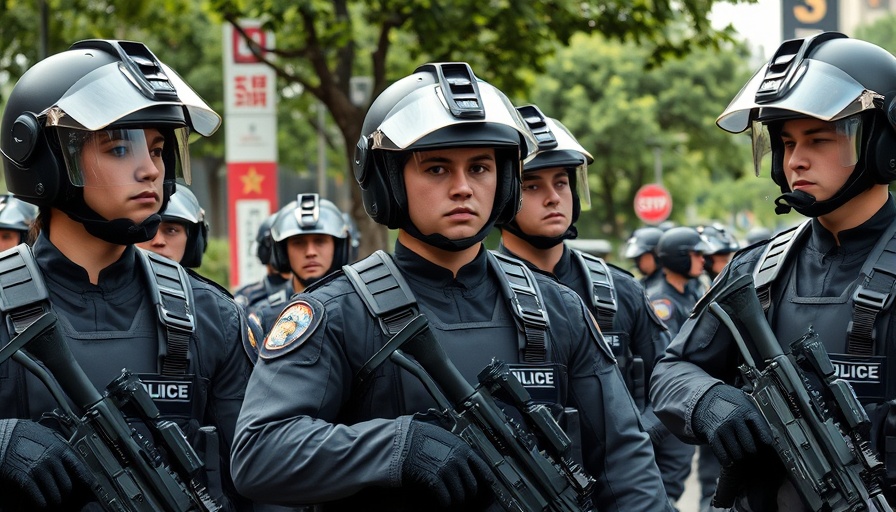
Unraveling the Crisis: A Look at Insecurity in Benue State
The recent escalation of violence in Benue State highlights a troubling trend of insecurity that has left citizens in fear and confusion. During a discussion on Politics HQ, experts analyzed the ongoing crisis involving deadly attacks attributed to herdsmen and the apparent inaction of government authorities. The incidents have raised concerns about the failure of governance in Nigeria, particularly in regions reliant on agriculture and pastoralism.
In 'Insecurity in Benue: Police Silent on Deadly Attacks,' the discussion dives into the alarming safety crisis in the region, exploring key insights that sparked deeper analysis on our end.
A Breakdown of the Farmer-Herdsman Crisis
The ongoing conflict between farmers and herdsmen in Benue can no longer be viewed merely as a competition for land and resources. As acclaimed historian and peace expert Professor Isaac Olawali Albert noted during the program, these attacks have escalated to what he described as 'genocidal attacks' targeting all segments of the population, not just agriculturists. In the faces of mounting evidence, like recent attacks resulting in at least 18 deaths in communities around Adikum and Naka, the nature of violence appears indiscriminate, encompassing various ethnic groups and professions.
Understanding Governmental Response and Public Sentiment
The community leaders and public sentiment reflect an overwhelming belief that the state's response has been lackluster. Mediotu, a human rights activist, underscored the confusion among local officials, stating, 'We are left to ourselves… the state government is so confused right now.' This sentiment resonates with many citizens who feel abandoned amid violence.
The state’s leaders have attempted to address the crisis by setting an ultimatum for herdsmen to vacate farming lands; however, the ineffectiveness of this tactic was highlighted when local communities began vacating in fear instead. This situation raises critical questions about the government's ability to protect its citizens.
The Myth of Complicity: Are Officials Implicated?
Allegations of complicity have surfaced, implicating traditional rulers and government officials in fostering an environment where violence prevails. Mediotu mentioned instances of traditional leaders being accused of accepting bribes from herdsmen, further complicating the narrative around governance failure. This has left communities questioning their security architecture and local leadership.
As Professor Albert pointed out, 'When a government is not able to protect citizens… that government has failed.' This draws attention to the broader implications of governance failure, marking the ongoing crisis as not purely local but rather indicative of a systemic breakdown.
Potential Solutions: Empowering Local Vigilantes
Emphasis has been placed on the need to empower local vigilantes who possess an intimate understanding of their environment. Advocating for community-led security measures could offer immediate relief. These local groups are often better positioned to respond effectively than overstretched police or military personnel. Empowering local communities could yield a more resilient response to varied types of violence.
However, as mediators of the peace process, community leaders argue the need for better support and resources to combat assailants equipped with sophisticated weaponry, notably AK-47 rifles used by many herdsmen. Thus, fortifying local vigilante groups presents a feasible and sustainable path forward.
The Role of Federal Government: Restructuring the Security Architecture
Both experts underline the necessity for the federal government to reevaluate its strategy in managing local security issues, advocating for state and community police frameworks. A decentralized approach could allow local leaders to respond more effectively to threats manifold in nature. It is often the case that crimes occur in remote areas, where the long response times of the federal forces can lead to disastrous outcomes.
The challenges in Benue State symbolize a greater malaise affecting different regions in Nigeria. The government must shift its approach and prioritize the protection of vulnerable communities, ensuring policies aimed at tackling insecurity do not merely exist as rhetoric.
Future Insights: What Lies Ahead?
The trajectory for Benue State remains precarious without significant intervention. As Professor Albert remarked, the failure of the state to effectively deal with the crisis would potentially tarnish Nigeria’s international image regarding governance and human rights. Critics suggest that until the motives behind these attacks are fully understood and addressed, both governmental and non-governmental efforts will remain ineffective.
In conclusion, the echoes of voices like Mediotu and Professor Albert call for urgent action amid the chaos in Benue. As the state grapples with deadly violence, it must look within and among its leaders to furnish a solution that fosters peace and security for all residents.
As you consider these insights, it’s essential to engage in advocacy for local solutions and to hold leadership accountable—your voice matters in shaping the future of community safety. Together, we can push for reforms that truly address the complexities of security challenges in Nigeria.
 Add Row
Add Row  Add
Add 


 Add Row
Add Row  Add
Add 

Write A Comment